5 Best Classical Homeschool Curriculum: Classical Education Programs
Posted by admin on
If you’re looking for a conservative homeschooling curriculum, you’ll probably love a classical curriculum. Classical curriculum is popular among Christian homeschooling families, many of which choose them for their rigorous training in literature, theology, Latin and critical thinking. But, if you’re new to this area, what curriculum should you choose? What are the best curriculum packages around?
- What is a classical homeschooling curriculum
- Reasons you might choose this method
- Four classical curricula for homeschools:
- Classical Conversations – more of a homeschooling co-op focus
- Veritas Press – great if you want more of an online program
- Memoria Press – great if you prefer a mailable program
- Classical Academic Press – customize your curriculum with this one
- One program you can use to customize your individualized homeschool education (A Well-Trained Mind Academy)
- A free classical homeschooling program where you can buy resources at will
Let’s get started!
Some of the links in this post are affiliate links. This means if you click on the link and purchase the item, I will receive an affiliate commission at no extra cost to you. All opinions remain my own.
What is a Classical Homeschooling Curriculum?
A classical homeschooling curriculum is a program you can use to teach your children in the way of classical education at home.
A program like this will teach students in three stages:
- The grammar stage – where children acquire the tools they need to learn the intricacies in the Classics later on. Children aged around 5-9 do the grammar stage. They do plenty of memorization of basic facts they will benefit from recalling later.
- The logic or dialectic stage – where children sort through facts they learned and start to analyze them logically. They start to form arguments with these facts. Children aged around 9 to 12 do the logic stage. Students do plenty of reading, compare & contrast, and talking with others to solidify arguments.
- The rhetoric stage – where teenagers synthesize the facts they learned and analyzed in the previous two stages and learn how to apply it to their lives. In this stage, students do a lot of debate and learn how to deliver a speech convincingly and persuasively.
To find out more about classical homeschooling, see this article.
Or, if you’d prefer a book, The Well-Trained Mind: A Guide to Classical Education at Home (Fourth Edition) is a popular choice. (This book is so so popular that it also has its own academy (which we review below) where students can participate in unit-study.)
Why You Should Use a Classical Homeschooling Curriculum
Some benefits of a classical education curriculum are that students:
- will know their facts well and relate them to principles in their lives
- can express themselves eloquently with sound arguments
- can write with structure and understanding
- find learning the intricacies of English easier with Latin as a background language
- will be able to learn new languages with more ease as they will have learned Latin
- are encouraged to think independently and critically and
- acquire principles for life not just facts and skills.
Because of all the benefits of this homeschooling method, this approach is being rediscovered in many traditional schools, and used in many homeschools, especially in America.
Four Classical Homeschooling Curricula
There are four popular classical education curricula for homeschooling families. These are:
- Classical Conversations
- Veritas Press
- Memoria Press and
- Classical Academic Press
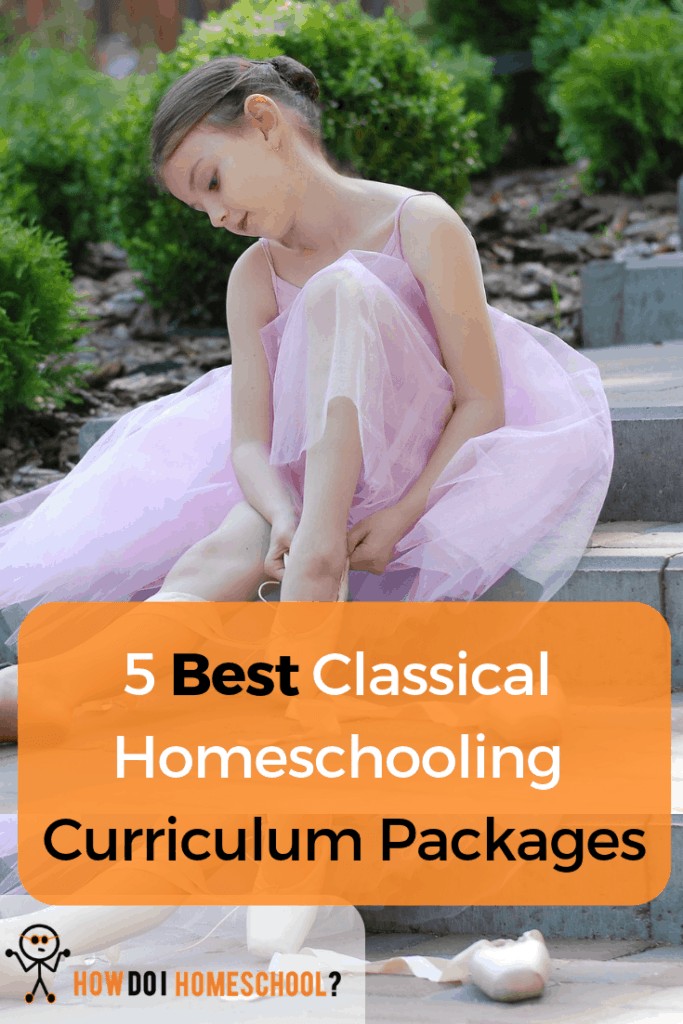
Classical Conversations
What CC Say About Themselves
One of the many benefits of homeschooling with a Christian homeschool curriculum is that educators have a standard purpose for education: to glorify God through the pursuit of truth so that our children grow to reflect this excellence of Christ to this lost and broken world. This Christ-centered educational style which combines grammar, dialectic and rhetoric phases has proven immensely successful and has cultivated great Christian leaders throughout history. No matter which stance secular education takes, the Christian foundation will always be the focus of a Classical Conversations.
How Much is Classical Conversations and What Grades Does It Offer?
Classical Conversations teaches K to Grade 12.
Children who are around age:
- 4 to 8 start in the Foundations course which is the Grammar stage of classical education. Foundations costs approximately $14 per week for 24 weeks, plus $135 plus a faculty fee. See link for extra information on cost. You also have the option of purchasing the workbook link on Amazon for Foundations.
- 9 to 12 do the Essentials course which is the Dialectic stage. Essentials costs approximately $14 per week for 24 weeks, plus $105 plus a faculty fee. See link for extra information on cost.
- 12+ do the Challenge course which is the Rhetoric stage. Challenge costs approximately $1,279 each year for 30 weeks, plus $175 plus a faculty fee. See link for extra information on cost.
If you plan on doing the course internationally or you are a missionary family, check out their International homeschooling page here as CC tries to accommodate missionary families who want to study their educational programs.
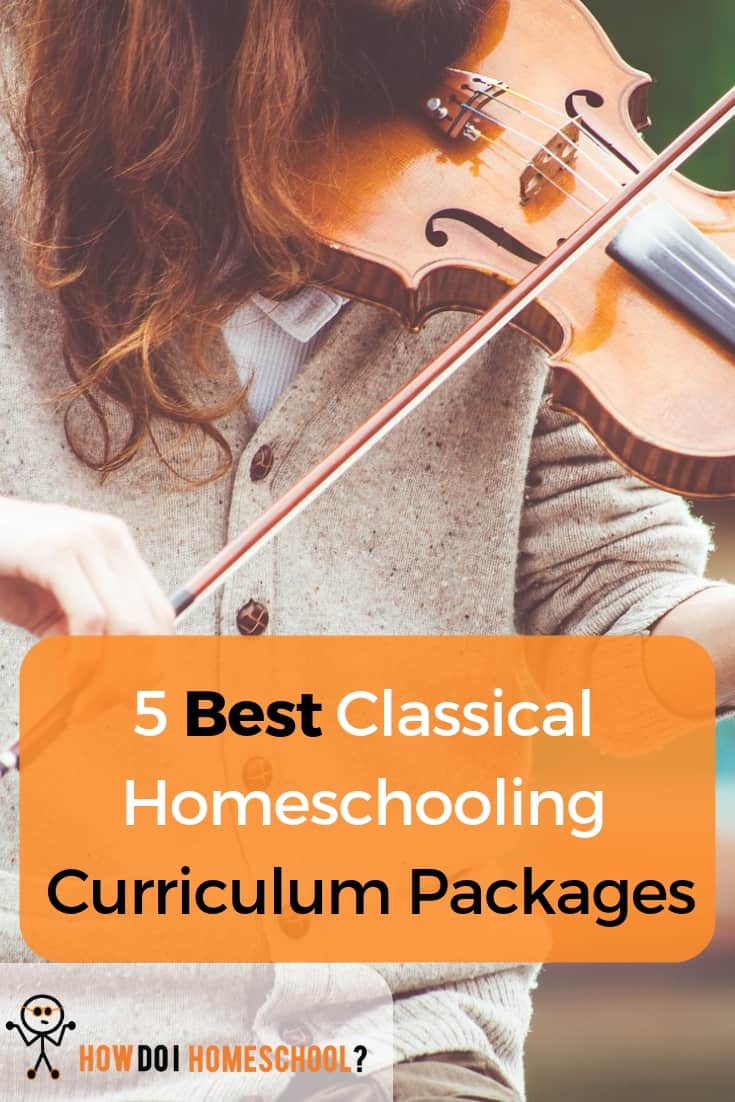
Features of this Homeschooling Curriculum
Classical Conversations is usually done in a co-op so homeschooled students can learn in groups for a few hours each week.
A big part of classical education is talking and this curriculum lets children talk with their teachers and other students face-to-face, something (I think) the other programs don’t do as well.
For example, to have a decent debate with one another, it’s easiest to be in the same room as your teammates and opponents. I can’t see how this would be easily facilitated in a virtual classroom.
The price is also a big drawcard as CC seems to be very reasonably priced, especially in comparison with other classical curricula.
Veritas Press
Veritas Press is also one of the best classical homeschooling curricula on the market today. The term ‘Veritas Press reviews’ is googled about 5,400 times a month in the United States alone. It’s also a great online program as a lot of the work is done in virtual classrooms or on computers with internet access.
How Much Is Veritas and What Grades Does It Offer?
Veritas offers three different plans each year from Grade K-12th. Prices between grades differ substantially, with younger grades being significantly cheaper, while older grades are significantly more expensive.
The three plans are:
- Good – for kindergarten, the cost is $249 for a basic plan which gives you the basic curriculum and every subject you need. Grade 12 costs $1,349 for the year.
- Better – intermediate plan between the ‘Good’ and the ‘Best’.
- Best – kindergarten is $749 for the best plan which gives you all the bells and whistles Veritas has to offer. Grade 12 costs $1,699 for the year.
As the Grades advance, the prices also do.
Features of this Classical Homeschooling Curriculum
With Veritas, your children can:
- access online lessons and interact with teachers online
- choose to do self-paced courses and
- do live courses online.
Veritas says things are so easy that you just need to:
- choose the grade your child is in,
- choose what you (and your children) want to study (customize the curriculum) and,
- place your order and you’ll get a boxed classical education curriculum in the mail!
Veritas Press also offers many free resources at this link as they’re motivated to share their resources because of their Christian faith.
See Veritas Press reviewed in more detail here.
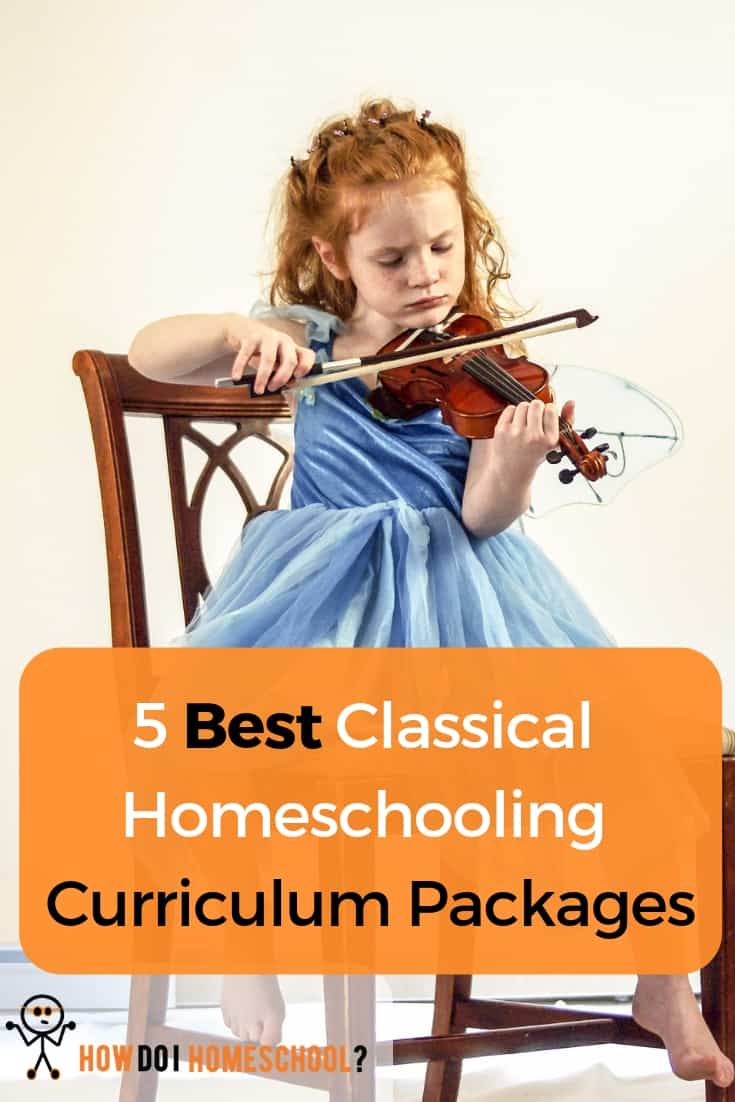
Memoria Press
Memoria Press is also a great classical homeschooling curriculum on the market today. The term ‘Memoria Press reviews’ is googled about 6,600 times a month in America alone.
This classical program offers physical books for purchase, so you’ll receive a box with the books/work paces you’ve chosen for your child.
The Homeschool Review Crew gave Memoria Press (Latin) the Award for the best foreign language curriculum in 2017.
How Much Is Memoria Press and What Grades Does It Offer?
Memoria Press offers a large range of curricula for use before children even reach Grade 1. They offer Preschool, Junior Kindergarten, and Kindergarten as well as Grades 1-12.
In comparison to Veritas, Memoria offers subjects for separate purchase. That is, Veritas will send you a whole grade’s worth of material, whereas Memoria will let you pick and choose more.
Also, for grades around 9+, a lot of curricula is labelled as suitable for that grade and older. That is, you can buy the:
- Acts of the Apostles set for $34 and it is suitable for Grade 9+. The cost is $34.
- Discovering Music: The Complete Set and it is suitable for Grade 8+. The cost is $149.
As such, the cost of Memoria Press will vary a lot depending on the material you purchase from them.
Features of this Classical Homeschooling Curriculum
Memoria Press works as an offline platform where you purchase books which they send to you. Many parents will like the offline platform in comparison to the other curricula which offer more online work.
This curriculum is also from a Christian perspective with some writers being Southern Baptist Seminary graduates, and others being from different places. You can read more about their religious background here.
Classical Academic Press
Classical Academic Press aims to teach a rigorous form of classical education as they hope to revive the liberal arts tradition in education establishments and homeschool today. They offer Latin, Greek, Writing and Rhetoric, Poetry, Literature Guides and more.
The term ‘Classical Academic Press’ is googled about 2,400 times a month in the United States alone.
Cost of Classical Academic Press and Grades Offered
This classical education curriculum offers all grades in three sections:
- Lower Grammer – Pre K -Grade 3
- Upper Grammar – Grade 4-6
- Logic and Rhetoric – Grades 7-12
It’s difficult to figure out the cost of Classical Academic Press as they don’t seem to offer a curriculum set for each grade. That is, to get the total cost of this classical curriculum, educators have to choose the book or book sets they wish children to study. Perhaps this is an intentional move to give parents the freedom to choose the subjects they like and skip the subjects they’re not so keen on.
Classical Education Curriculum for Free?
The following is a high-brow, high-IQ curriculum, which has been adopted by homeschoolers and schools. The creators of this free online curriculum have sought to address the lack of any sound online classical curriculum. Based upon the 19th-century German-Latin method and following the great-books model, this curriculum often attempts to be highbrow, emphasizing the best of occidental traditions while avoiding the anti-Western political correctness one finds in public schools. The following materials list can be used as a stand-alone curriculum or as a supplement to another curriculum. Many parents have said that this book list served as an outstanding supplement to other curricula. Our outline for classical languages, literature and history is one of the best on the internet…The following curriculum can serve as a [secular] curriculum or a Christian [program]. While the following curriculum is non-religious per se and devoid of an explicit fundamentalist Christian worldview, it includes an implicit Christian perspective in that much of post-classical literature includes a Christian worldview (e.g. Dante, Shakespeare, etc.)…
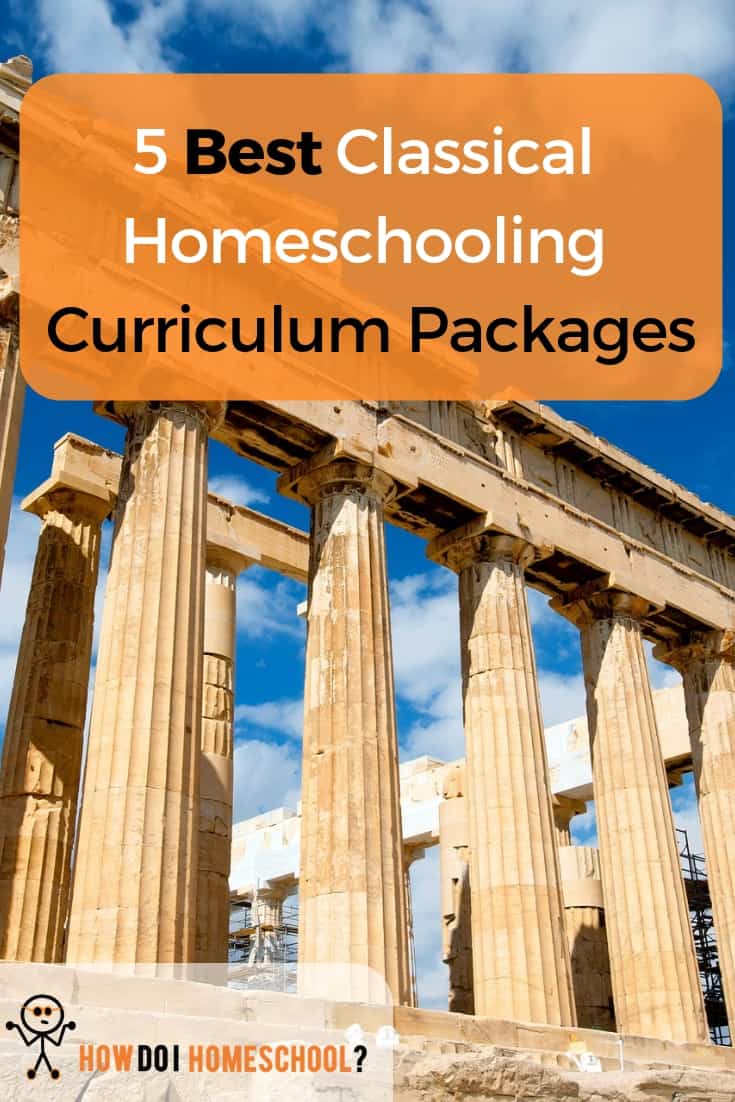
Am Eclectic Curriculum – My Father’s World
If you don’t want a full-blown classical curriculum, but you want some of what a classical education offers, you might consider something like My Father’s World.
This program combines different homeschooling methods with a classical education. Specifically, it combines classical education with the Charlotte Mason elements, Unit Study, and Bible (see picture below from MFW website).
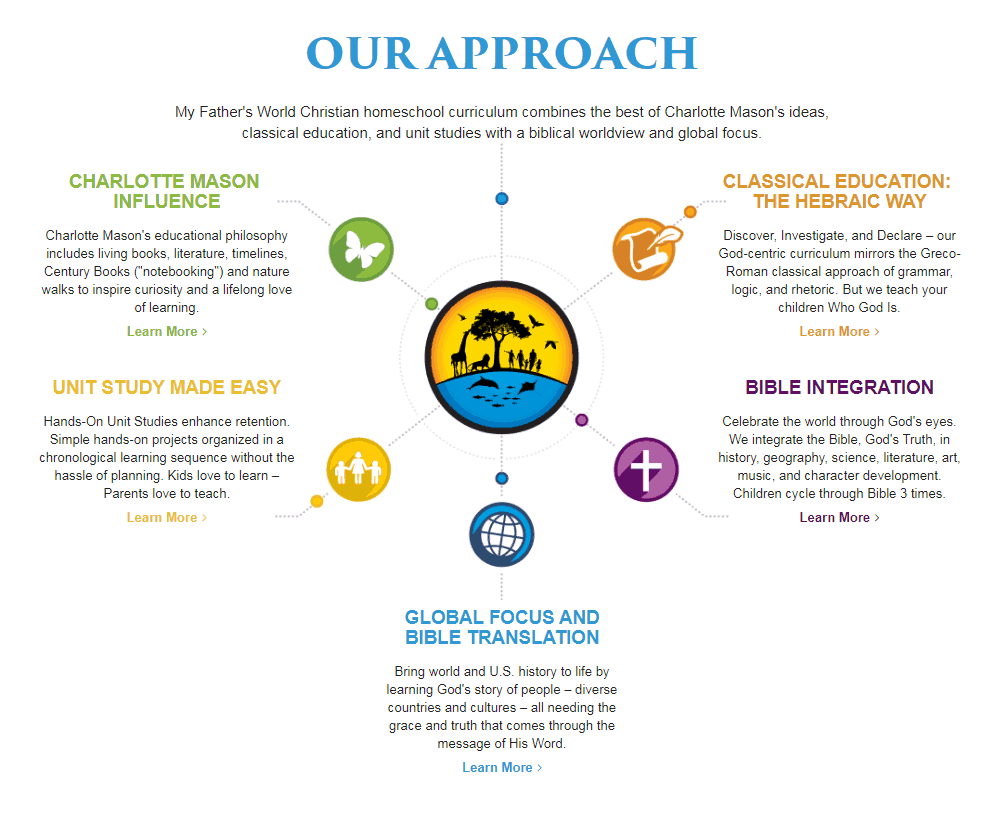
Combining classical education with Charlotte Mason methods is an extremely popular choice among Christian homeschooling families in America.
This is because some people consider Classical homeschooling methods a little too rigorous, and seek to soften them somewhat with the addition of Charlotte Mason methods.
Charlotte Mason was a classical educator who developed her theory of education around the 1800-1900s. Her method used a lot of theory from classical education but softened it somewhat to reduce the memorization components and rote learning.
Instead, Mason said we should use more interesting books to teach children with (called living books) and get children out into nature more. She also said we should use more gentle ways of testing students, called narration.
If you buy the My Father’s World curriculum, you’ll get different elements from both these theories.
A Program that can Supplement Your Custom Classical Education
Conclusion
The post 5 Best Classical Homeschool Curriculum: Classical Education Programs appeared first on How Do I Homeschool.

